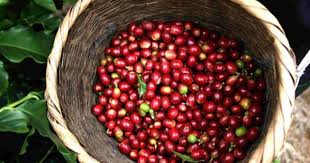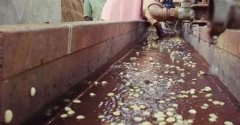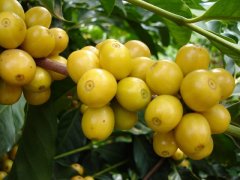Description of Ndimaini Farm in Kenya introduction to the Coffee Trading system in Kenya
For professional baristas, please follow the coffee workshop (Wechat official account qianjiecoffee)

Kenya is a model country for producing fine coffee beans. Coffee was introduced from Britain in 1900. Only traditional Arabica did not have the best bourbon species of SL28 and SL34 in Kenya until 1950. All water treatment methods and graded AA PLUS AA AB systems are adopted, but this is only a difference in particle size uniformity and does not represent a difference in quality. High quality elevations range from 4200 to 6800 feet. From 2009 to 2010, production decreased and prices rose due to global warming and pathological changes. After that, fine coffee continued to rise and the irreplaceable BlackBerry flavor of Kenyan coffee kept the price of good Kenyan beans at a high price. therefore, direct coffee is the first choice to buy better quality Kenyan beans, larger beans with high wine BlackBerry acid, can be harvested twice a year, April-June is the secondary season. October-December is the harvest season in the main production season.
Most of the coffee beans are graded by the Kenya Coffee Bureau and sold at the auction venue. The system of public auction can be traced back to the way of auction before 1934. Kenya has 50 licensed agents who send sample beans to their customers for cup testing. Customers can bid for their favorite coffee at the auction. But this approach seems to encourage intermediary agents to erode farmers' income, so in 2006 Kenya opened 32 more independent sales agents to contact foreign coffee buyers directly without going through auctions. however, these must meet the standards such as the Kenya Coffee Agency's guarantee to the quality Storage Bank before they can be sold. The two systems operate in parallel at the same time, and after several years of development, it is the most transparent auction distribution system. The better the quality of coffee, the better the price through the cup, so that more cooperatives and farms are willing to join, but I think the latter can get first-hand information in direct contact with farmers.
Gikanda Ndimaini Ntami Farm in Kenya is a cooperative of several small farmers, together with Kangocho and Gichathaini to form a Gikanda cooperative, located in Nyeri District, with an average elevation of about 1700-1900 meters, and handed over to its own Kangocho treatment plant for exquisite treatment. Small farmers grow the traditional unimproved traditional variety SL28,SL34, and water the fully ripe cherries by hand on the same day. Before shipment, the silver skins are scrubbed with parchment.

The price of Kenya beans has been high in recent years, but the actual income of farmers is less than 1 pound 1 US dollars, after deducting production costs, almost all the rest go to pay bank loans, there is very little left, the largest intermediate exploiters are Kenyan agricultural dictatorship officials, these officials do not want to see a more progressive Kenya, if you would like to support Kenyan beans through the Fair Trade Fair Trade Association system, at least this is a transparent and just coffee.
Property Characteristics: farm characteristics
Farm Farm: Gikanda FCS Cooperative Ndimaini Entami Farm (Club)
Grade level: AA
Country country: Kenya Kenya
City City: Nyeri

Region: Karatina town
Altitude altitude: 1600-1800 m
Farm Size farm size: small coffee farmers who grow in small areas.
Soil soil: Red Volcanic Loam soils volcanic clay
Harvesting Method: Hand picked is harvested by hand
Certification Certification: Fair Trade Fair Trade Association
Coffee Characteristics: coffee characteristics
Variety varieties: SL 28, SL 34
Processing System treatment: Full Washed washing drying on African viaduct
Important Notice :
前街咖啡 FrontStreet Coffee has moved to new addredd:
FrontStreet Coffee Address: 315,Donghua East Road,GuangZhou
Tel:020 38364473
- Prev

Detailed introduction of Musasa Cooperative of Gatta Guana processing Station of Musasha Group in Rwanda
For professional baristas, please follow the coffee workshop (Wechat official account qianjiecoffee) Rwanda is famous for its "Land of Thousand Hills" and the biographical film "Land of Gorillas in the Mist". The country is less than half the size of Scotland, but it has more than 3 million residents and is a landlocked part of East Africa.
- Next

Kenya Gikanda Cooperative Kangocho Kangguqi Farm details Kenya AA
For the exchange of professional baristas, please follow the coffee workshop (Wechat official account qianjiecoffee) Kenya AA Kangguqi Kangocho Farm Kenya is a model country for producing fine coffee beans. Coffee was introduced from Britain in 1900, and only traditional Arabica did not have the best bourbon species of SL28 and SL34 in Kenya until 1950. All water is collected and treated.
Related
- Does Rose Summer choose Blue, Green or Red? Detailed explanation of Rose Summer Coffee plots and Classification in Panamanian Jade Manor
- What is the difference between the origin, producing area, processing plant, cooperative and manor of coffee beans?
- How fine does the espresso powder fit? how to grind the espresso?
- Sca coffee roasting degree color card coffee roasting degree 8 roasting color values what do you mean?
- The practice of lattes: how to make lattes at home
- Introduction to Indonesian Fine Coffee beans-- Java Coffee producing area of Indonesian Arabica Coffee
- How much will the flavor of light and medium roasted rose summer be expressed? What baking level is rose summer suitable for?
- Introduction to the characteristics of washing, sun-drying or wet-planing coffee commonly used in Mantenin, Indonesia
- Price characteristics of Arabica Coffee Bean Starbucks introduction to Manning Coffee Bean Taste producing area Variety Manor
- What is the authentic Yega flavor? What are the flavor characteristics of the really excellent Yejasuffi coffee beans?

